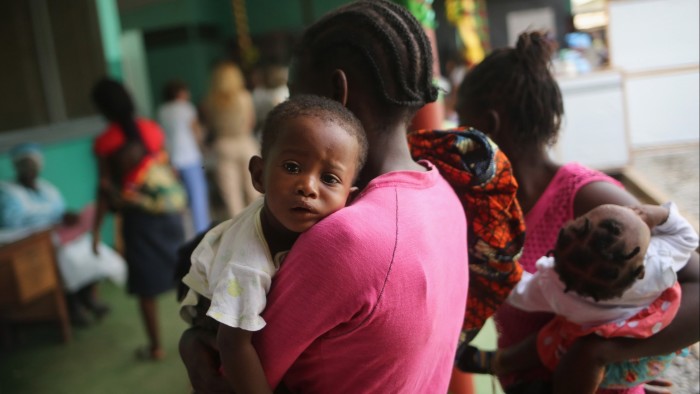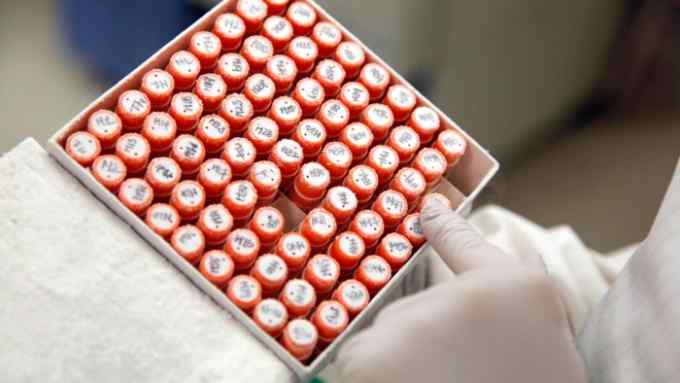We need transformational change to be ready for the next pandemic

Roula Khalaf, Editor of the FT, selects her favourite stories in this weekly newsletter.
The writer is a former president of Liberia, Nobel Prize winner and member of The Elders, a group of global leaders
When Ebola emerged in Liberia almost a decade ago, we had very few tools and little support to fight it. It took a full nine months — once infections had spread beyond West Africa and I had appealed directly to President Obama and UN Secretary General Ban Ki-moon — before the UN system fully responded. The international response, along with the dedicated work of community groups, helped to bring Ebola to an end — but not before it had killed more than 11,000 people in west Africa. Afterwards, we still had no licensed vaccines or treatments, nor the technology in the region to develop them.
That should have been a ‘never again’ moment. With worldwide news coverage, all countries should have seen that pathogens can spread across borders in a matter of hours. Political leaders should have made pandemic readiness a priority. The value of UN solidarity should have been built upon. The hoarding of for-profit vaccines and other medical technologies in the global north should have been reconsidered.
However, just a few years later, Covid-19 swept across the planet. Governments did not co-ordinate enough in response. International funds were released far too slowly. Vaccines were produced in record time, but people in developing countries had to wait at the back of the line. Huge gaps in health systems were exposed.
I am 84 years old. In my eight decades, the technological advances have been astounding. We have the ability to rapidly stop disease outbreaks, create vaccines, and protect people of all incomes. But we don’t have nearly enough political will.
This is hurting people and economies. The UN’s Sustainable Development Goals have been set back. Friction between wealthy and poorer countries seems to be growing. The risk of new infectious outbreaks is only increasing as climate change takes its toll.
I have firm ideas on what we need to fix the system, drawing on what I have learned as co-chair of The Independent Panel for Pandemic Preparedness and Response, established by the World Health Organization in 2020, and the UN Secretary-General’s High-Level Advisory Board on Effective Multilateralism.
First, political leaders must treat pandemic risks as existential. This is one of very few threats that can change the world as we know it, within days. We should have a standing international council of presidents and prime ministers to ensure we are prepared and build a monitoring system to ensure accountability. National leaders must ensure all sectors of society have a readiness plan that takes into account not only health systems, but also ways to protect vulnerable people. It should span a range of sectors including education, business continuity, communications and procurement.
Second, we need to accelerate efforts to provide dependable financing, both for readiness and for times of crisis. The Pandemic Fund hosted by the World Bank is a good start but, so far, just 20 per cent of the $10.5bn needed has been pledged. There are no firm plans to ensure crisis funding when a pandemic threat emerges. We need a model where every country contributes according to their means, with allocations based on need. The money required is modest compared with the trillions of dollars in lost GDP during Covid-19.
Third, to stop epidemics and thwart pandemic risks, people’s health rather than commercial profit must come first. Scientists in the Global South must have full access to the technologies to develop new vaccines, treatments and tests. Just as infectious disease presents a common global threat, the tools to control them and protect people should be a common global good. We have waited too long on the wrong side of the Atlantic for effective vaccines to protect against Ebola, Lassa Fever, tuberculosis, or malaria. Regions need to be self-reliant and rapidly able to produce the tools required locally.
Fourth, all countries have a duty to strengthen health systems and move towards universal health coverage. Health is a human right and healthy populations are a social and economic strength. Yet about 2bn people remain at risk of catastrophic or impoverishing health expenses.
There are real opportunities to make the transformational change that ensures we are ready for the next pandemic threat. Unfortunately, the UN General Assembly political declaration set to be approved this month lacks the commitments required to secure sustained political leadership, multisectoral planning and action.
Member states of the WHO must start to make real headway on a pandemic accord. Amendments to the International Health Regulations should result in a more streamlined alert system.
I intend to maintain the pressure to secure a world better protected from pandemic threats. Younger leaders must do the same. When they are in their eighties, they should be able to look back to reflect on a world where everyone, everywhere is as safe as possible from infectious disease and pandemic risks. I challenge them to create this world, starting today.

Comments